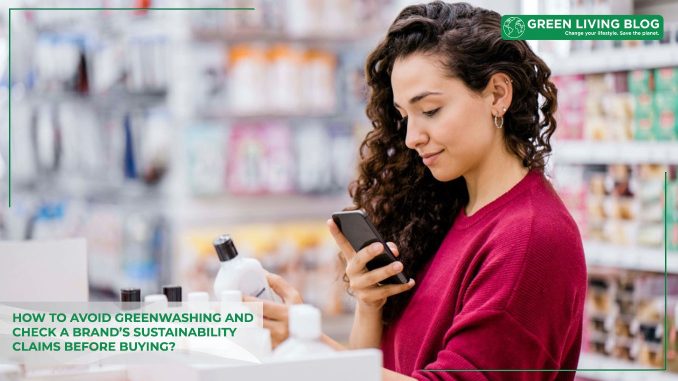
Almost every business seems to have a sustainability or environmental commitment agenda these days as the global climate crisis makes increasingly more headlines.
Consumers want to contribute to the environment with their actions and try to shop wisely, making informed choices with regard to the products and services they purchase.
However, one must dig deep before getting the full picture of a brand’s sustainable and ethical practices, and let’s be honest, not many of us do have the time nor the resources to do so on a daily basis.
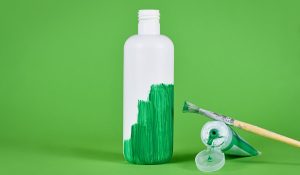
So, how can consumers investigate whether a business is keeping its promises and not using so-called greenwashing to pretend it is doing its bit for the environment?
Let’s uncover possible solutions and ways to empower consumers on their business research journey.
Look out for these suspicious Green Marketing Methods
- Generalizations or words used that are “wishy-washy” such as “eco-friendly” can be misleading and do not clearly declare what the company does.
- Comparisons that make the company’s measures appear far more environmentally friendly than others, e.g., “they use non-recyclable plastic, and we use recyclable plastic”.
- “Greening” non-ethical products to make them appear a better choice, e.g., biodegradable plastic bottles/containers. The second issue here is that the word “biodegradable” is not regulated and does not equal “compostable”.
- Jargon or information used that is hard to understand or difficult to check due to a lack of accessibility.
- Presenting manipulated claims or data as fact and providing no proof of the claim.
- Highlighting a green attribute to overshadow other less sustainable measures, e.g., using organic cotton for fast fashion items.
Search for recognized Green Certifications
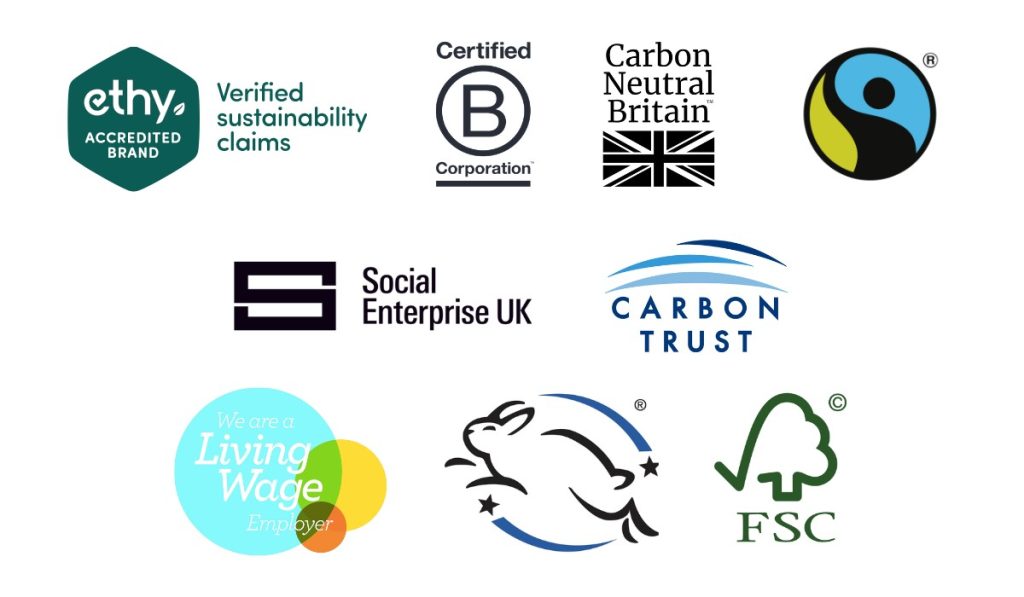
- B Corp is a certificate confirming that a business is legally required to benefit the environment and the people who help create its products.
- Carbon Trust is a certificate ensuring that a business meets a certain standard of carbon emission reduction to minimise its carbon impact.
- Carbon Neutral Britain is a certificate confirming that the organisation has measured its total carbon dioxide emissions and engaged in offsetting initiatives to the extent that it has reached net-zero emissions.
- ethy is a certificate showing a brand’s verified sustainability claims against transparent standards, demonstrating contribution to the UN Global Goals, and empowering consumers to make sustainable choices.
- Fairtrade is a certificate confirming that the products are sourced from a verified fair trade supply chain and are fair trade verified, therefore ensuring workers’ rights, safer working conditions, and fairer pay.
- Forest Stewardship Council (FSC) is a certificate confirming that the product is made using sustainable or responsibly managed wood sources.
- Leaping Bunny is a certificate indicating that the product has not been tested on animals and is cruelty-free.
- The living Wage certificate means that the company pays the Living Wage to employees ensuring a decent standard of living in the UK and in London.
- Social Enterprise UK is a certificate that the organization has a primarily social purpose and reinvests or donates at least half of its profits to support the community in overcoming a need or a challenge.
Look for Brands and Products that consider these Aspects of Sustainability
From the sustainability standards that ethy has developed alongside other industry experts, we can see that there are six main areas where brands should be taking real action to be sustainable.
1. Stable Climate
Brands that are serious about stopping climate change are proactive in tracking their impact, setting goals, and actively cutting their emissions. This includes actions like becoming carbon neutral, using renewable energy sources, and investing in carbon offsets for anything that cannot be reduced.
2. Clean Planet
Brands that contribute to a clean planet and reduce pollution are putting recycling, composting, upcycling, and waste reduction at the top of their agenda. Especially, look for brands that use alternatives to plastic, because in today’s world most things don’t need to be made from plastic!
3. Responsible Resource Usage and Production
We need to be smart about how we use our planet’s resources and how we approach development in a sustainable way. This means looking for brands that use water efficiently, keep supply chains local and use a circular economy model to get maximum benefit and value from resources.
4. Healthy People
Socially responsible companies focus on the health and well-being of their customers by providing products that support healthy lifestyles and contribute to overall public health. Look for natural, clean, and organic ingredients.
5. Thriving Communities
When companies support the communities in which they operate, it can be a real force for good. Look for social enterprises and brands that support fair trade, gender equality, and living wages and give back to their communities.
6. Protecting Biodiversity and Animal Welfare
To create a truly sustainable world, we must consider wildlife and the ecosystems that are crucial for our planet’s health. Brands that work to protect the interests of wildlife will be vegan, cruelty-free, use sustainable palm oil and actively protect the natural environment.
Use free Apps and Extensions for your Research and Sustainable Shopping
In this digital age where almost everyone owns a smartphone, using an app is a fast and easy solution to manage our daily lives.
Here are some green apps that can save a lot of time and help with various aspects of everyday life to incorporate sustainability:
ethy
ethy also has a free app that does all the research and verification of brands’ sustainable claims for you. It provides a huge number of brands available in the UK in most categories from fashion to food, drinks and even utilities. Search on ethy by category, keyword, or sustainability area such as ‘plastic free’, ‘clean beauty’, ‘vegan’, ‘female led’ and many more.
The best bit is that all brands on ethy are certified ethical, and each brand has a fully transparent sustainability profile. The app also tells you which UN Sustainable Development Goals each brand contributes to.
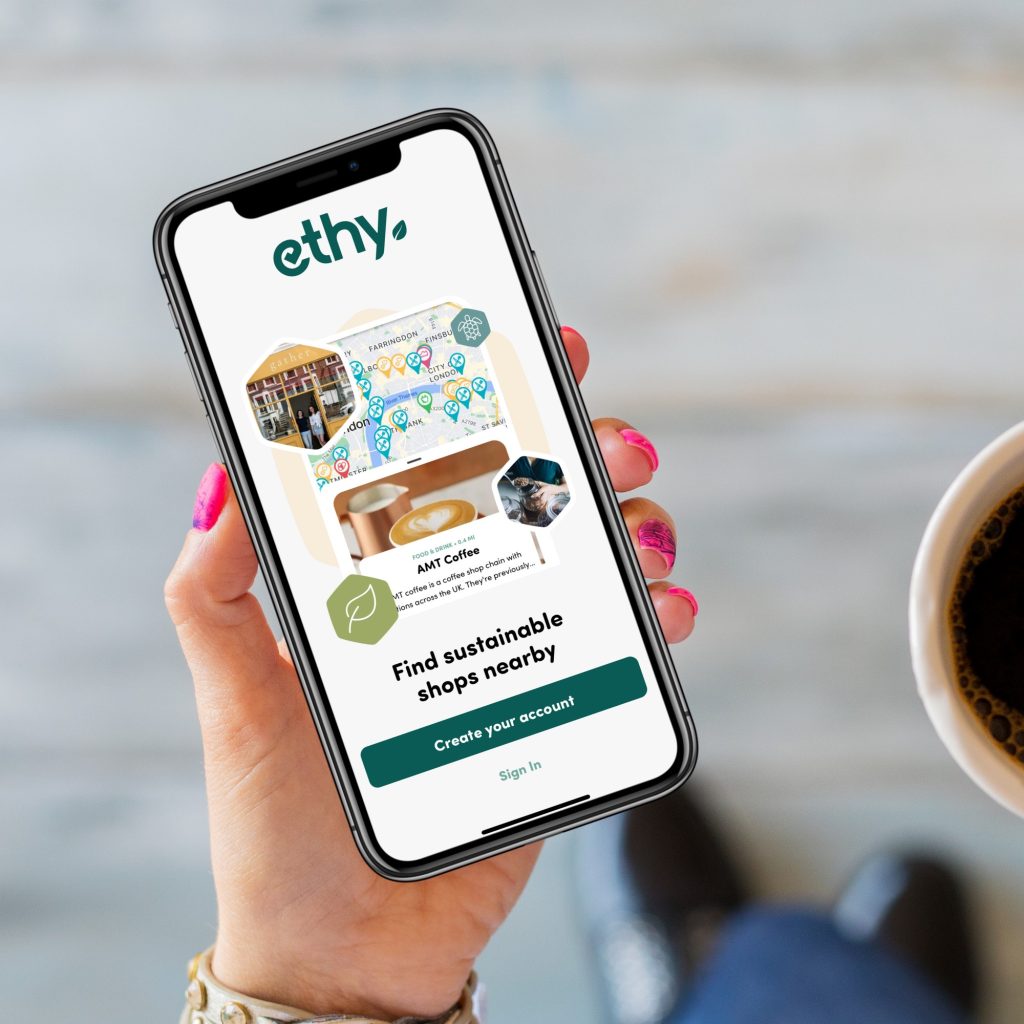
The map feature of the app allows you to find sustainable brands near you too.
The Beagle Button
Beagle is a free browser extension that suggests eco-alternatives for the things you need to buy when you want to buy them. The beagle button also allows you to customize your purchases according to your values. Choose what ‘better’ means to you, whether it’s plastic-free, vegan, or organic, Beagle will have a product to suit your preferences
What has the Beagle Button launch taught us about ethical shopping habits? Find out here ➡️https://t.co/j9ol4Vlglo
— The Beagle Button (@thebeaglebutton) November 7, 2022
Hurr
HURR is a platform for designer fashion rental, reinventing ownership and driving circular fashion. As fashion is one of the most polluting industries in the world, HURR is transforming fashion for the planet providing you over 7,000 designer clothes for rent.
View this post on Instagram
Olio
Food is also a big source of emissions and waste production. Therefore, apps like OLIO help to improve this system by allowing anyone to share food and use the food that would otherwise have gone to waste. The best bit? It’s totally free!
We’re over the moon 💫 to announce that @Olio and @Tesco have now rescued an incredible 30 million meals!
This is a HUGE moment for us here at Olio – we’d like to thank the team at Tesco, and all our amazing Food Waste Hero volunteers.
Read more here: https://t.co/AyF7sDdYek pic.twitter.com/2ABOf5EEyg
— Olio • Your local sharing app (@OLIO_ex) February 10, 2023
Circa5000
“Your pension is powerful. Greening it is 21x more effective at cutting carbon than stopping flying, going veggie & switching energy suppliers combined.” CIRCA5000 is an app that helps you easily invest in a brighter, more prosperous future by providing a solution for sustainable pensions by doing all the work for you to ensure the businesses you invest in are not polluting or causing climate change. It’s also much less boring than it sounds!
Wrapping Up
With the above ideas and tips, it should be possible for any consumer to make informed decisions about their choices and to evaluate whether they are sustainable, ethical, and authentic.
Greenwashing can be detected with the provided methods so that consumers can shop with a clear conscience, feeling reassured that they are on the right track to living a greener, healthier, and a better life while ensuring that we all do our bit to fight the climate change and pollution crisis on our planet.
![]()
Author Profile
- Online Media & PR Strategist
- Blogger and Educator by Passion | Senior Online Media & PR Strategist at ClickDo Ltd. | Fascinated to Write Lifestyle Blogs in News & Education I have completed a journalism summer course at the London School of Journalism and manage various blogs.
Latest entries
 LeisureApril 16, 202510 Best Green UK Hotels for Eco-Tourists
LeisureApril 16, 202510 Best Green UK Hotels for Eco-Tourists Best practicesApril 14, 20258 Best Ways to Reduce Your Carbon Footprint
Best practicesApril 14, 20258 Best Ways to Reduce Your Carbon Footprint Green Expert GuidesMarch 28, 2025Lisbon Living: Where Sustainable Charm Meets Urban Energy
Green Expert GuidesMarch 28, 2025Lisbon Living: Where Sustainable Charm Meets Urban Energy EnvironmentJanuary 21, 2025Buying Eco-Friendly Homes: 6 Eco Questions to Ask Your Real Estate Agent
EnvironmentJanuary 21, 2025Buying Eco-Friendly Homes: 6 Eco Questions to Ask Your Real Estate Agent

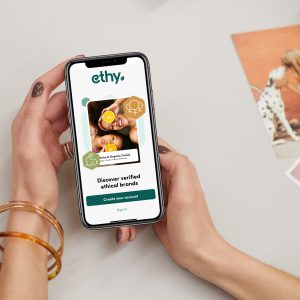





Leave a Reply
You must be logged in to post a comment.